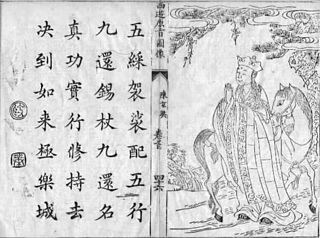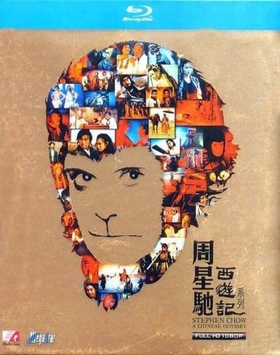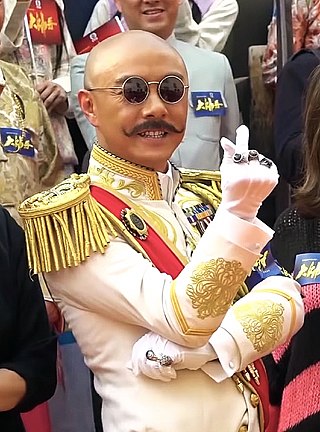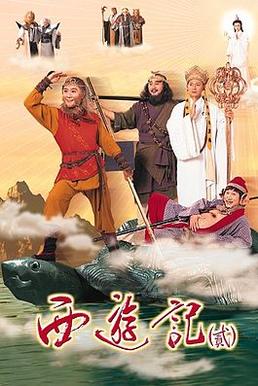Journey to the West is one of the Four Great Classical Novels of Chinese literature attributed to Wu Cheng'en.
Contents
Journey to the West may also refer to:
Journey to the West is one of the Four Great Classical Novels of Chinese literature attributed to Wu Cheng'en.
Journey to the West may also refer to:

The Monkey King, also known as Sun Wukong in Mandarin Chinese, is best known as one of the main characters in the 16th-century Chinese novel Journey to the West and many later stories and adaptations. In said novel, Sun Wukong is a monkey born from a stone who acquires supernatural powers through Taoist practices. After rebelling against heaven, he is imprisoned under a mountain by the Buddha. After five hundred years, he accompanies the monk Tang Sanzang (唐三藏) riding on White Dragon Horse and two other disciples, Zhu Bajie and Sha Wujing, on a journey to obtain Buddhist sutras from the West (India), where Buddha and his followers dwell.

Journey to the West (Chinese: 西遊記; pinyin: Xī Yóu Jì; Wade–Giles: Hsi1 Yu2 Chi4) is a Chinese novel published in the 16th century during the Ming dynasty and attributed to Wu Cheng'en. It is regarded as one of the greatest Classic Chinese Novels, and has been described as arguably the most popular literary work in East Asia. Arthur Waley's 1942 abridged translation, Monkey, is known in English-speaking countries.

Tang Sanzang is a Buddhist monk and pilgrim who is a central character in the 16th century novel Journey to the West by Wu Cheng'en. Tang Sanzang is based on the historical Tang Dynasty monk, Xuanzang.

Saiyūki, also known by its English title Monkey, is a Japanese television drama based on the 16th-century Chinese novel Journey to the West by Wu Cheng'en. Filmed in Northwest China and Inner Mongolia, the show was produced by Nippon TV and International Television Films and broadcast from 1978 to 1980 on Nippon TV.

Daoji, popularly known as Ji Gong, was a Chan Buddhist monk who lived in the Southern Song. He purportedly possessed supernatural powers through Buddhist practice, which he used to help the poor and stand up to injustice. However, he was also known for his wild and eccentric behavior and didn't follow Buddhist monastic rules by consuming alcohol and meat. By the time of his death, Daoji had become a legend in Chinese culture and a deity in Chinese folk religion. He is mentioned by Buddhists in folktales and kōans, and sometimes invoked by oracles to assist in worldly affairs.

A Chinese Odyssey is a two-part 1995 Hong Kong fantasy-comedy film directed by Jeffrey Lau and starring Stephen Chow.

Monkey: A Folk-Tale of China, more often known as simply Monkey, is an abridged translation published in 1942 by Arthur Waley of the sixteenth-century Chinese novel Journey to the West conventionally attributed to Wu Cheng'en of the Ming dynasty. Waley's remains one of the most-read English-language versions of the novel. The British poet Edith Sitwell characterized Monkey as "a masterpiece of right sound", one that was "absence of shadow, like the clearance and directness of Monkey's mind." The translation won the James Tait Black Memorial Prize in 1942.

Zhang Jinlai, better known by his stage name Liu Xiao Ling Tong, is a Chinese actor, best known for his role as the Monkey King in the 1986 television series Journey to the West adapted from the classic Chinese novel of the same name. Zhang adopted his father Zhang Zongyi's stage name, Liu Ling Tong, and amended it to Liu Xiao Ling Tong.

Dicky Cheung Wai-kin is a Hong Kong actor and singer.

Journey to the West is a Hong Kong television series adapted from the 16th-century novel of the same title. Starring Dicky Cheung, Kwong Wah, Wayne Lai and Evergreen Mak, the series was produced by TVB and was first broadcast on TVB Jade in Hong Kong in November 1996. A sequel, Journey to the West II, was broadcast in 1998, but the role of the Monkey King was played by Benny Chan instead, due to contract problems between Dicky Cheung and TVB. Cheung later reprised the role in another television series The Monkey King: Quest for the Sutra (2002), which was broadcast on TVB but not produced by the station.

Journey to the West is a Chinese television series adapted from the 16th-century novel of the same title. Production for the 66 episodes long series started on 12 September 2009, and it was first broadcast in mainland China on 28 July 2011 on TVS. The series was produced by Zhang Jizhong and was released a year later than another television series of the same title, but with a different cast and crew.

Journey to the West is a Chinese television series adapted from the 16th-century novel of the same title. The series was directed and produced by Cheng Lidong and starred Zhenxiang, Victor Chen, Xie Ning and Mou Fengbin in the leading roles. It was first aired on Zhejiang Satellite TV (ZJSTV) in China on 14 February 2010. This version is not to be confused with the 2011 television series of the same title produced by Zhang Jizhong.

Bull Demon King, also translated as the Ox King and known as his self-proclaimed title the Great Sage Who Pacifies Heaven, is a fictional character from the 16th century novel Journey to the West. He is the husband of the Princess Iron Fan and father of Red Boy. He is a demon king based in Sky Scraping Cave on Accumulated Thunder Mountain.

Journey to the West II is a Hong Kong television series adapted from the 16th-century novel Journey to the West. The series was produced by TVB and was first broadcast on TVB Jade in Hong Kong from October to December 1998. It is a sequel to the 1996 television series Journey to the West, also produced by TVB, which covered only the first half of the novel. Benny Chan takes over the role of the Monkey King from Dicky Cheung in Journey to the West II, while the other principal cast members Kwong Wah, Wayne Lai and Evergreen Mak reprise their roles from the previous series.

Journey to the West: Conquering the Demons is a 2013 fantasy comedy film co-written and produced by Stephen Chow and co-directed by Chow and Derek Kwok. The movie was first announced in July 2011 and was released on February 10, 2013 in China. The film is a loose comedic re-interpretation of the 16th-century novel Journey to the West, a Chinese literary classic often believed to be written by Wu Cheng'en.
Wu Cheng'en and Journey to the West is a Chinese television series about the life of Wu Cheng'en and his inspiration for writing the 16th-century novel Journey to the West. The series was directed by Kan Weiping and consists of a total of 45 episodes shot in high definition, each 45 minutes long and containing 10 minutes of 3-D effects. The original lead actors of the 1986 television series Journey to the West starred in Wu Cheng'en and Journey to the West and reprised their roles: Liu Xiao Ling Tong as Sun Wukong, Chi Chongrui as Tang Sanzang and Ma Dehua as Zhu Bajie. Sha Wujing, however, was portrayed by Liu Dagang because the original actor, Yan Huaili, died in April 2009. It was broadcast by Shandong Qilu TV in July 2010.

The Monkey King 2 is a 2016 Hong Kong-Chinese action fantasy film based on the classic 16th-century novel Journey to the West by Wu Cheng'en. The film was shot in 3D and is a sequel to the 2014 box office hit The Monkey King with Cheang Pou-soi returning as director and Sammo Hung as action director, who replaces Donnie Yen's role from the previous installment. The film stars Aaron Kwok, who portrayed the main antagonist in the previous installment, as the film's titular protagonist, who also replaces Yen from the previous installment. It was released in the United States on 5 February, in Hong Kong on 6 February and in China on 8 February 2016. A sequel, The Monkey King 3, was released in China in 2018.
Liu Dagang is a Chinese actor best known for his role as Sha Wujing in the 1986 television series Journey to the West. He is a National Class-A Actor.

Journey to the West: The Demons Strike Back is a 2017 Chinese fantasy adventure comedy film directed by Tsui Hark. A sequel to Stephen Chow's 2013 film Journey to the West: Conquering the Demons, it was produced and co-written by both Tsui and Chow.